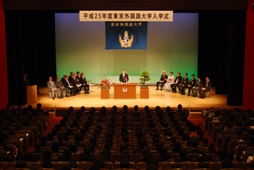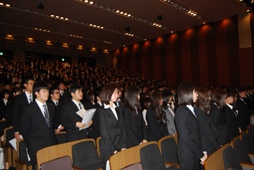The 2013 Entrance Ceremony Held on April 4.
May 9, 2013


2013 President of The Tokyo University of Foreign Studies’ Entrance Ceremony Speech
As the president and a representative of the Tokyo University of Foreign Studies, I congratulate everyone here on their entrance to The Tokyo University of Foreign Studies. Moreover, I thank all guardians, listening to this ceremony today in Multimedia Hall 101 of the Research and Lecture Building, from the bottom of my heart.
Today, we welcome 398 new entrants to the School of Language and Culture Studies, 392 new entrants to the School of International and Area Studies, 164 new entrants to the Postgraduate Program, and 63 exchange students entering the Japanese Language Centre for International Students. Standing before all of you, full of high hopes, my body and soul are humble.
The Tokyo University of Foreign Studies, which will be your new place of learning, can be rooted to the Banshoshirabesho, which was established in 1857. It is not too much to say that the history of foreign studies in our nation started with the founding of this institution.
In 1873, the Tokyo School of Foreign Studies was founded upon studies in English, German, French, Russian, and Chinese. In 1897, after a series of complications, the school was incorporated as a language school for an industrial high school, and, in 1899, it became independent as the e Tokyo School of Foreign Studies.
In these early years, the school raised numerous people, such as Kanzo Uchimura, Inazou Nitobe, and Choumin Nakae, who left large footprints in modern Japanese history. Names of these and other notable people, who largely contributed to the history of the school, or university as it is today, are engraved one by one in each seat of this Prometheus Hall, which you are in now. Please take a look at these engraved names if you would like.
Moreover, in 1949, with the commencement of the new university system, the school started its new beginnings as the Tokyo University of Foreign Studies. At the time, the university had 12 majors in a department of the Faculty of Foreign Studies. In 2012, the Faculty of Foreign Studies was restructured into the School of Language and Culture Studies, and the School of International and Area Studies. The university was reborn into a university of foreign studies encompassing all of the earth, while holding 14 global regions and 27 languages as its core areas of studies.
The School of Language and Culture Studies, while placing its main focus on education in languages and cultures of various regions from around the world, aims to raise personnel with outstanding working abilities and detailed knowledge of languages and cultures of Japan and other countries of the world. The School of International and Area Studies, while placing importance on education in politics, economics, and societies of various regions of the world, aims to foster personnel with practical abilities in solving problems with a global perspective. The Postgraduate Program aims to raise highly skilled, international educators and professionals with a comprehensive view encompassing languages, cultures, histories, and societies of various regions of the world.
Furthermore, the Tokyo University of Foreign Studies places, in its bachelor and postgraduate programs, importance on general education as well as it does on specialized education. We call this general education, which I believe you all should acquire, “global liberal arts.” Here, I would like to explain why the adjective, “global,” is present.
I believe the word “global” began to become popular around when most of you were born. Phenomena, such as global warming and acidic rain, became a usual presence, and the notion that humanity must consider environmental issues on a global scale heightened. In 1992, among United Nations, a conference, or an “the Earth Summit” so to speak, was held regarding the environment and development. It was around then that the phrase, “Think globally, Act locally,” became one of common use. The close relationship between local (regional) society and global (world) society is what is now the 21st century, global society. I wish all of you to develop, at this university, the ability to perceive things in their entirety on a worldly scale with an “overlooking view.”
“Global” has another meaning. It means “overall” or “comprehensive.” In modern day society, academics are becoming increasingly complex and advanced, and scientific technology is progressing remarkably. However, we must recognize that tragedies towards humanity can arise from believing too deeply in this technology, as exemplified by the earthquake and nuclear accident of two years ago. Therefore, it is important to acquire “global knowledge,” which spans the academic ranges of humanities, social studies, natural studies, and applied science, in order to resolve the diverging, complex mechanisms of global society, and to judge things accurately.
There is another reason why “global” is set on a pedestal. The reason comes from criticism towards the fact that general education is interpreted as being grounded on art and culture. Art and culture are important without a doubt, but general education is much wider. The mistaken notion that “liberal arts,” in English, means “art” in Japanese, as translated by Nishiamane during the Meiji period, seems to still exist today. However, the original meaning of liberal arts refers to the various abilities of people living in freedom, as in ancient Rome, it signified the crafting and practical knowledge that free people possessed, and slaves did not. In Medieval Europe, as the 7 sciences of freedom, grammar, rhetoric, dialect, mathematics, geometry, astronomy, and music were regarded as academics needed to be acquired before moving on to specialized work.
In this era of 21st century global society, where the segmentation and specializing of academics continues to advance without end, liberal arts needs to be a global element. Hence, it needs to be an interdisciplinary and practical knowledge of philosophy, history, social studies, natural science, arts, education, foreign languages, and environment. I believe all of you entered this university with dreams and desires. I wish for all of you to obtain worldly general education and specialized knowledge here, and to use them towards realizing your dreams. Furthermore, I wish for all of you, in the near future, to play an active role as free people of the modern age, or in other words, global citizens.
Lastly, I would like to say congratulations to our new students here at Japanese Language Center for International Students.
JLC is a leading Japanese language educational institution established in 1970. It has been under the Joint Usage Center for Education, since last year. It is my most sincere wish that your Japanese language abilities blossom while here at JLC - a place in which ideas and culture are expressed in Japanese. May you take the language and culture learned here at JLC and move on to your own area of expertise.
Finally, I hope that all of you may become a bridge to Japan and your own place in the future, and I wish that all of you fill this part with great honor and dignity.
Thank you.
April 4, 2013
Hirotaka Tateishi
President of the Tokyo University of Foreign Studies
